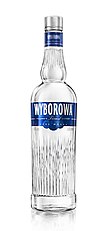Vodka in Poland

Poland is the country of origin of vodka . In Poland, vodka has been one of the most popular drinks for centuries. With 260 million liters of distilled vodka, Poland is the fourth largest vodka producer in the world after Russia, the USA and the Ukraine, and the largest in the EU.
history
middle Ages
The doctor Nikolaus from Poland , who worked at the court of Leszek II in the 13th century, dealt with the distillation of alcohol for medicinal purposes and described it. She was taught at the Faculty of Medicine at Kraków University in the 14th century . The first written mention of vodka comes from the court files of Sandomierz from 1405. It can be assumed that the invention of vodka production took place at the transition from the 14th to the 15th century. The medieval vodka had an alcohol concentration of about 25%. Initially, vodka was not used for general consumption, but as a medicine. In the Middle Ages it did not seriously compete with beer and wine in Poland as an everyday drink.
Early modern age
The doctor and botanist Stefan Falimirz from Kraśnik collected common recipes and production methods of various spirits, including vodka and nalewkas, as well as their beneficial effects in the book O ziołach i mocy ich (German: About herbs and their powers ) published in 1534 . When viticulture in Poland declined due to the beginning of the Little Ice Age in the early modern period , vodka production increased, which soon competed with beer in Poland . Poland-Lithuania was the largest grain producer in Europe. Grain was shipped down the Vistula and then exported via Danzig and Elbing to Western Europe, particularly the Netherlands and England . In the second half of the 17th century, both the sales markets and Poland-Lithuania were involved in numerous military conflicts, which reduced grain exports, but not grain production. There was thus an oversupply of grain in Poland-Lithuania, which was now increasingly used for vodka production. Krakow , Poznan and Danzig were their centers. When the grain export stabilized again at the beginning of the 18th century and its oversupply was reduced, potatoes were also used for vodka production. The vodka distillery JA Baczewski was established in 1782 and introduced the still common distillation process in Wybranówka near Lemberg . Most Polish brands of vodka were created in the 19th century.
Modern
After the First World War , a monopoly law for vodka was passed in the Second Polish Republic . There were around 1200 vodka distilleries. During the Second World War , many vodka distilleries were destroyed and looted. In 1973 all distilleries in the People's Republic of Poland were organized in the Polmos state-owned company . In 1991 this was again divided into various individual companies, most of which were privatized or closed by 1998. In 2013 a purity law was issued for Polish vodka. In 2017 the Museum of Polish Vodka was opened in Warsaw , dealing with the more than 600-year history of the drink. Vodka consumption has been steadily declining in Poland since the 1980s. Meanwhile, vodka is only the fourth most popular alcoholic drink in Poland. Beer is back at number one.
Legal bases
Vodka production, trading and serving are regulated by law in Poland. A license is generally required for this. In the case of retail and serving to end consumers, the respective body of local self-government is responsible for licensing.
In Poland, a spirits tax is levied as a consumption tax.
Alcohol consumption in public places is regulated in Poland. There is a general ban on consumption with the option that local self-government can regulate exceptions.
Vodka market
Before the Second World War there were 1200 vodka distilleries in Poland, in 1995 only 950, in 2000 only 380 and in 2016 only 60. Most of the vodka producers come from the broken-up Polmos and belong to large foreign corporations:
- Polmos Zielona Góra , Polmos Poznań - part of the French group Pernod Ricard
- Polmos Białystok , ŚFD Sp. Z oo w Wołczynie - part of the US group Central European Distribution Corporation
- Polmos Łańcut , Polmos Żyrardów , FWG w Starogardzie Gdańskim - part of the French group Marie Brizard Wine & Spirits
- Polmos Wrocław - part of Akwawit SA
- Polmos Lublin - part of Stock Polska
- Polmos Szczecin - part of Szczecińska Fabryka Wódek “STARKA”
- Polmos Siedlce - part of Podlaska Wytwórnia Wódek “Polmos”
- Polmos Toruń - part of Toruńskie Wódki Gatunkowe
- Polmos Bielsko-Biała
- Polmos Warszawa
Other Polmos spin-offs such as Koneser Warszawa , Polmos Łódź, Polmos w Sieradzu and Polmos Kraków have been liquidated.













